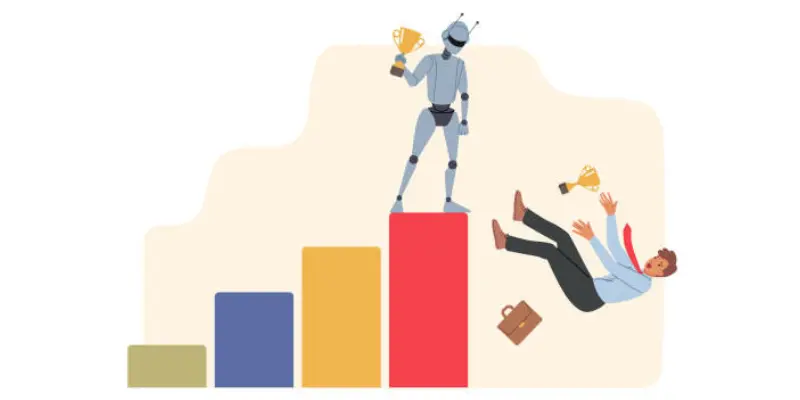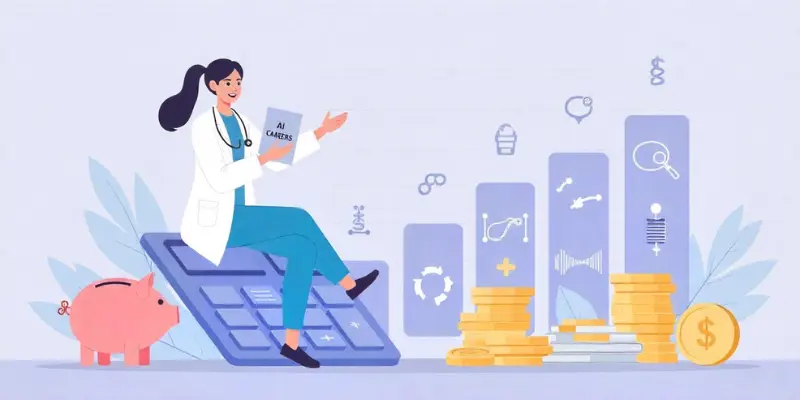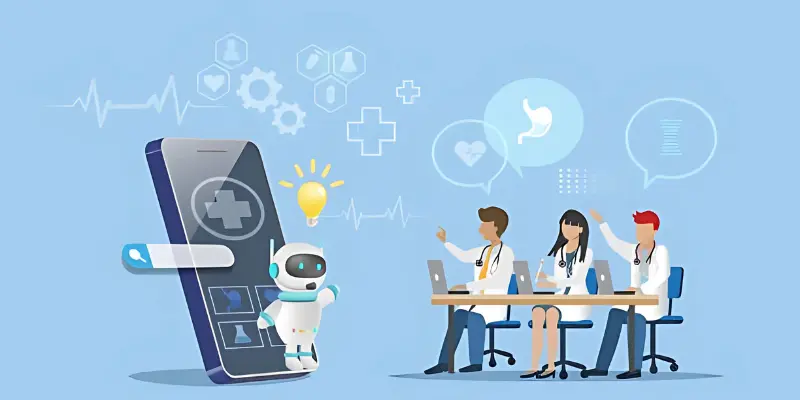AI in Healthcare Jobs: Your Career Just Got a Major Upgrade
Published: 24 Jun 2025
Last year, AI helped doctors at Boston Children’s Hospital catch 40% more heart problems in babies. But here’s the real shocker – they didn’t fire any doctors. Instead, they hired 15 new AI specialists. Sounds confusing? You are not alone. Many healthcare workers worry that AI will take their jobs. The news makes it sound scary. Robots replacing nurses. Computers doing surgery. But the real story is completely different.
AI is creating more healthcare jobs than ever before. New roles with better pay. More time to help patients. Yes, some jobs are changing. But most are getting better, not disappearing. In this post, we are going to discover which healthcare jobs AI makes easier, the surprising new careers AI creates and real stories from nurses and doctors using AI every day. Ready for some good news? Your healthcare career is not ending because of AI. It’s about to get a whole lot more interesting.

How AI Is Changing Healthcare Jobs Right Now
AI is bringing a revolution in healthcare from simple diagnosis to assisting in complex surgeries. Let’s look at what healthcare jobs AI makes easier and what it replaces.
Jobs AI Makes Easier (Not Replaces)
AI doesn’t want your job. It wants to make your job better. Think of AI as a super-smart assistant that never gets tired and catches things you might miss. Imagine, Dr. Martinez at Cleveland Clinic used to spend 3 hours reading chest X-rays every morning. Now AI spots problems in 30 seconds. Does this mean Dr. Martinez lost her job? Nope. She now spends those extra hours talking to patients and planning treatments. Her patients are happier. She’s less stressed. Everyone wins.
At Seattle Children’s Hospital, smart alerts tell nurses when a patient’s condition changes. The AI watches heart rates and breathing patterns 24/7. When something looks wrong, it sends an alert. Nurse Jennifer says, “It’s like having an extra pair of eyes that never blink.” She catches problems faster and saves more lives.
Lab workers can also see the benefits, AI can spot cancer cells in blood tests in minutes. What used to take hours now happens instantly.
Tasks AI Takes Over
AI loves boring, repetitive work. Good thing humans hate it! Here’s what AI gladly handles:
- Scheduling appointments: AI chatbots book patients 24/7
- Sorting medical records: Computers organize files in seconds
- Basic data entry: No more typing the same information twice
- Simple image analysis: AI spots obvious problems in scans
Real example: Mercy Hospital’s AI system schedules 200 appointments daily. The front desk staff now spend time helping confused patients and answering important questions instead of playing phone tag.
AI takes the boring stuff so humans can do the meaningful work. Would you rather type data all day or comfort a worried patient? AI makes that choice easy.
New Jobs AI Creates in Healthcare
With the increasing role of AI in healthcare, it brings new opportunities for the IT members in the health sector.
AI Specialists in Hospitals
Surprise! The biggest job boom in healthcare is not for doctors or nurses. It’s for AI specialists. Hospitals are hiring these new workers faster than they can train them.
Sarah used to be a radiology technician. Now she teaches AI systems how to read mammograms. She shows the computer thousands of breast cancer images. “It’s like training a really smart student,” Sarah says. “Except this student never forgets what I teach.” AI trainers earn 40% more than traditional tech jobs. Every major hospital needs at least three.

Data managers keep everything safe: Remember all those patient records? Someone needs to organize them for AI systems. Data managers make sure patient information stays private and organized. They are like librarians for medical data. Houston Methodist hired 25 data managers last year. They couldn’t find enough qualified people.
AI coordinators help doctors: Not all doctors love new technology. AI coordinators teach medical staff how to use new AI tools. They answer questions like “Why is the AI suggesting this treatment?” Dr. Kim at Johns Hopkins says, “My AI coordinator makes me feel confident using new tools. I’m not afraid of making mistakes anymore.”
Tech Support for Medical AI
Smart medical devices need smart people to fix them. AI maintenance workers are the new heroes of healthcare. When an AI system breaks down during surgery, these workers fix it fast. They earn $75,000 to $120,000 per year. Hospitals can’t hire them fast enough.
Digital health coaches are booming too. Patients use AI apps to track their health at home. But many patients don’t know how to use these apps. Digital health coaches teach patients over video calls. They help grandparents use heart monitoring apps and show busy parents how to track their child’s asthma. Coach Maria says, “I help 50 patients per week from my home office. Every patient I help stays healthier.”
Success story: Phoenix Children’s Hospital created 35 new AI jobs in 2024. They started with zero AI workers in 2022. The hospital CEO says, “AI didn’t eliminate jobs. It created an entire new department.”
Skills Healthcare Workers Need Now
Now AI is almost becoming a necessity for better healthcare. If the professionals embrace it, they will get more chances to prolong their careers but if not they may face problems. Here is what healthcare providers should learn.
Basic Tech Skills
Don’t panic! You don’t need to become a computer programmer. But you do need some basic tech skills. Think of it like learning to drive a car. You don’t need to know how the engine works. You just need to know how to use it safely.

Here’s what matters most: Using tablets and computers confidently. Most hospital AI tools work on iPads or computer screens. If you can use Facebook or send emails, you can learn these systems. Nurse Tom says, “I was scared of computers. Now I use three different AI apps every day. It took me two weeks to feel comfortable.”
Understanding simple data helps too. AI shows you charts and numbers. You need to know what they mean. Is 85% good or bad? What does “high risk” really mean? Don’t worry, this is not complicated math. It’s more like reading a weather report. Practice looking at simple graphs and charts.
Learning new software quickly is key. Hospitals update their AI systems often. Workers who adapt fast do better. The secret? Don’t try to memorize everything. Learn where to find help buttons and how to ask questions. Maria, a lab tech, says, “I bookmark the help pages and ask my supervisor when I’m stuck. Now I’m the person others ask for help.”
People Skills Become More Important
Here’s the amazing part: As AI handles more technical tasks, human skills become super valuable. Patients need comfort, understanding and trust. AI can’t give hugs or hold hands.
Talking to patients with care matters more than ever. When AI suggests a scary diagnosis, patients look to you for comfort. They need someone to explain things simply. They want to know they are safe. Dr. Lisa says, “AI gives me the facts. But patients need me to help them understand and feel better.”
Working in teams gets easier with AI. AI shares information instantly between departments. The X-ray tech, nurse and doctor all see the same data at the same time. This means better teamwork. But you still need to communicate well with your colleagues.
Problem-solving skills shine brighter. Sometimes AI gets confused or makes mistakes. Humans need to step in and figure out what’s really happening. Creative thinking and common sense become your superpowers.
Action Steps You Can Take Today
Ready to prepare? Here are simple steps:
- Take free online courses: Many Websites offer basic computer skills training
- Practice using health apps: Download a fitness app and learn how it works
- Ask your IT team for training: Most hospitals offer classes for new systems
- Watch YouTube videos: Search “how to use medical software” for helpful tutorials
- Find a tech-savvy coworker: Ask them to show you tricks during lunch breaks
Remember: You don’t need to become an expert overnight. Start small. Learn one new thing each week. In six months, you will be amazed at how much you know.
Which Healthcare Jobs Are Safest?
Now, let’s talk about which healthcare jobs are completely free from being replaced by AI, no matter how advanced it becomes.
Jobs That Need Human Touch
Many healthcare jobs are completely safe from AI. Why? Because patients need real human connection. AI can’t give hugs, show empathy or truly understand how someone feels.
Therapists are in high demand. Physical therapists help patients walk again after accidents. Speech therapists help stroke patients talk. Mental health therapists listen to people’s problems. AI can suggest exercises or track progress. But patients need human encouragement and emotional support. Therapist Katie says, “My patients don’t want to cry in front of a robot. They need a real person who cares.”
Surgeons stay essential. Yes, AI helps surgeons plan operations. Some robots even help with precise cuts. But human surgeons make the big decisions. They handle unexpected problems during surgery. Dr. Rodriguez explains, “AI shows me the best way to remove a tumor. But if something goes wrong, I need human judgment and quick thinking. Patients trust my hands, not a machine.”
Mental health workers are more important than ever. Depression, anxiety and stress are rising. People need counselors, social workers and psychiatrists. AI can screen for mental health problems. It can even suggest treatments. But healing happens through human relationships. Counselor James says, “My patients need to feel heard and understood. AI can’t replace genuine human compassion.”
Jobs That Might Change
Some jobs will look different but they won’t disappear. These workers will use AI as a powerful tool instead of doing everything by hand.
Radiologists adapt and thrive. AI now reads X-rays and MRI scans super fast. Does this scare radiologists? Some were worried at first. But Dr. Chen says, “AI finds the obvious problems in seconds. I spend my time on the tricky cases that need expert eyes. I’m more valuable now, not less valuable.” Radiologists who learn AI earn more money than those who don’t.
Medical coders get AI helpers. These workers turn doctor notes into billing codes. AI can suggest the right codes quickly. But humans still check the work and handle complex cases. Coder Sandra explains, “AI does the easy stuff. I handle complicated patients with multiple conditions. My job got more interesting, not harder.”
Pharmacy technicians work smarter. AI helps count pills and check for drug interactions. Technicians now spend more time talking to patients about their medications. They answer questions and catch problems AI might miss. They are now more confident doing their jobs rather than being replaced. Tech Mike says, “I’m not just counting pills anymore. I’m helping people stay healthy.”
The Reassuring Truth
Here’s what experts know: AI creates more jobs than it eliminates in healthcare. A recent study found that hospitals using AI hired 20% more workers in two years. Why? Because AI helps hospitals treat more patients. More patients mean more jobs for humans.
AI makes workers better, not jobless. Think of AI like a calculator. Calculators didn’t eliminate math teachers. They made math teachers more effective. The same thing happens with AI in healthcare. It makes healthcare workers more powerful and helpful.
So, If you care about helping people, your job is safe. AI handles data and routine tasks. Humans handle hearts, minds and healing. That’s not changing anytime soon.
Conclusion
So guys! In this article, we covered AI in healthcare jobs in detail. It’s clear that AI is not replacing healthcare workers, it’s enhancing their abilities and opening new doors. If you are in the medical field or thinking about entering it, I highly recommend learning the basics of AI now. It’s a smart move for staying ahead of the curve. Ready to future-proof your career? Start learning and get involved in this exciting evolution.
Related Queries
Here are frequently asked questions about AI in Healthcare Jobs:
No, AI helps doctors, it doesn’t replace them. It can find patterns or make suggestions but only humans make final medical decisions. Patients still need real care, trust and empathy.
Nope! Most healthcare AI tools have simple interfaces like apps or dashboards. You just need basic computer skills and a willingness to learn.
Not at all. Many roles like AI trainers or digital health coaches are filled by people with medical experience not tech backgrounds. You just need curiosity and openness to change.
Yes, AI can get things wrong, especially if it’s given bad data or unusual cases. That’s why human oversight is always needed. You will work with AI, not rely on it blindly.
Not necessarily. Many free or low-cost resources are available online (like Coursera, YouTube, and Khan Academy). Learning small, basic digital skills goes a long way.
Most people feel comfortable after a few weeks with regular practice. It’s like learning a new app. You don’t need to master it all at once. Just take it step by step.
That’s okay! Many healthcare workers start with little tech experience. Ask coworkers for help, take short training sessions and practice. Your confidence will grow fast.
Yes! Roles like digital health coaching, data entry and remote monitoring support can be done from home. These jobs are growing fast, especially after COVID-19.
Start by improving your digital skills and staying curious about new tools. Ask about AI training at your workplace or take free online classes. Small steps make a big difference over time.
Probably! Many hospitals already use AI for scheduling, scans or alerts, even if you don’t notice. Ask your IT or clinical team about this, they will likely show you what’s in place.





